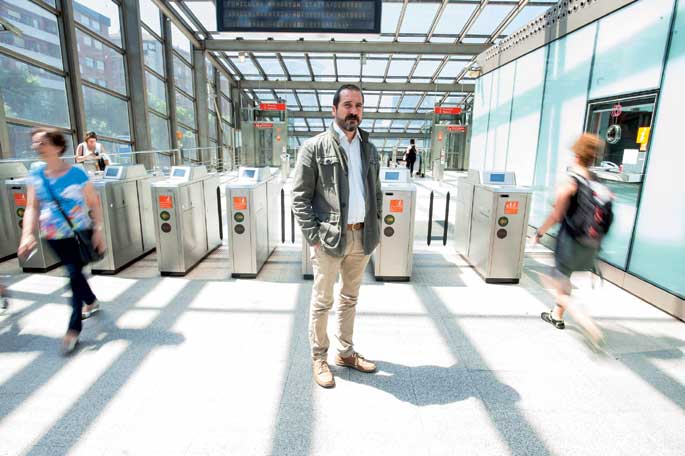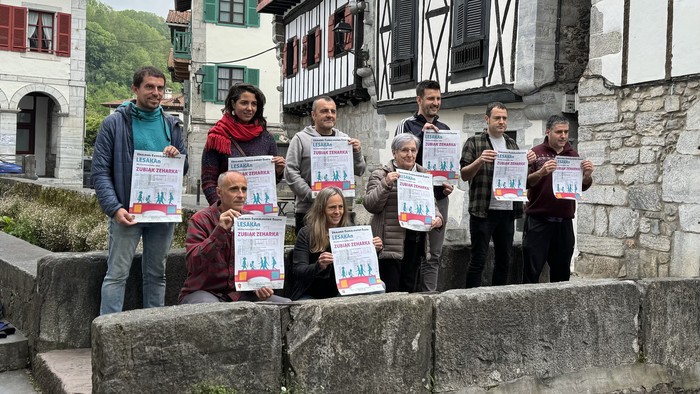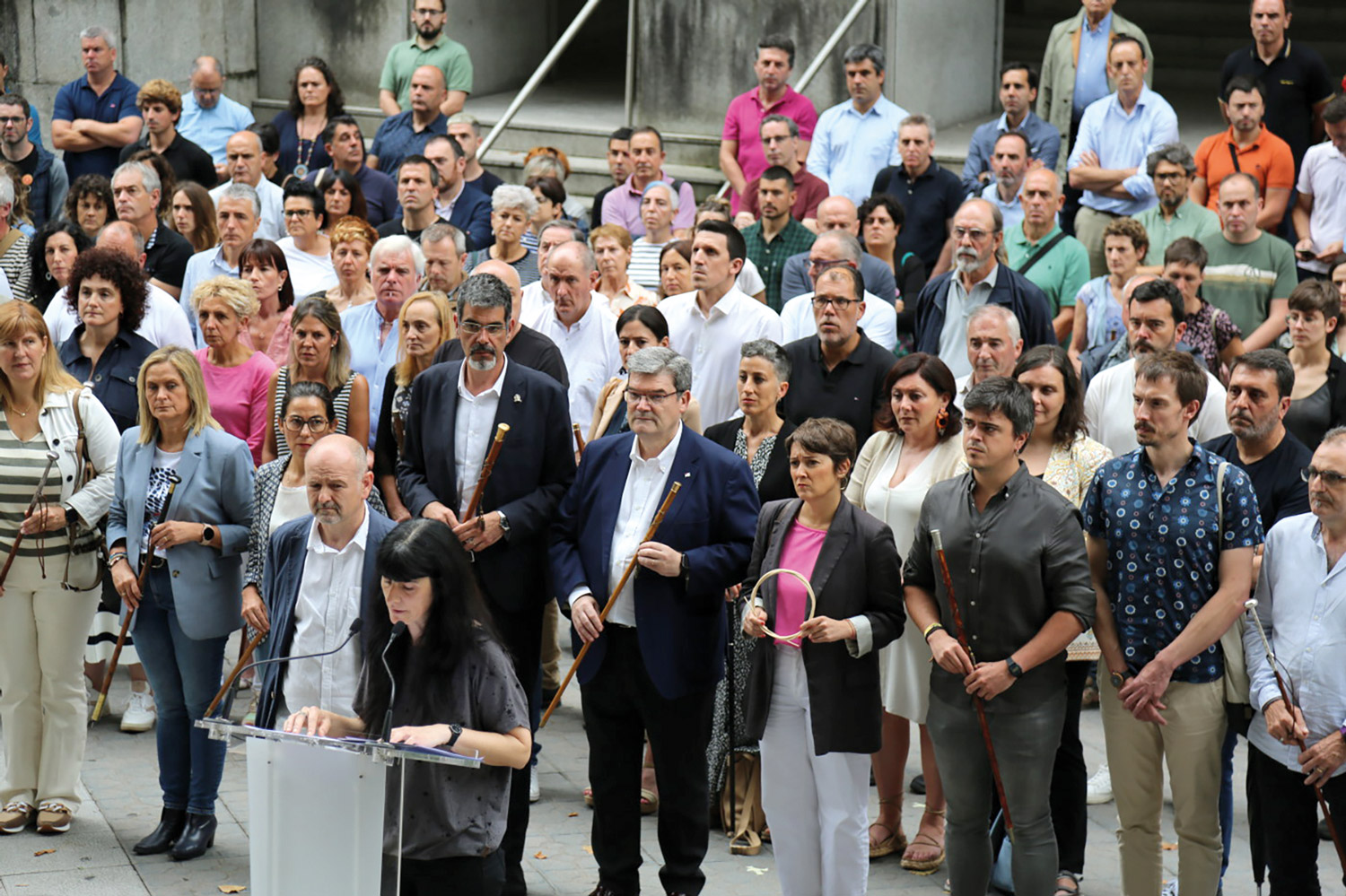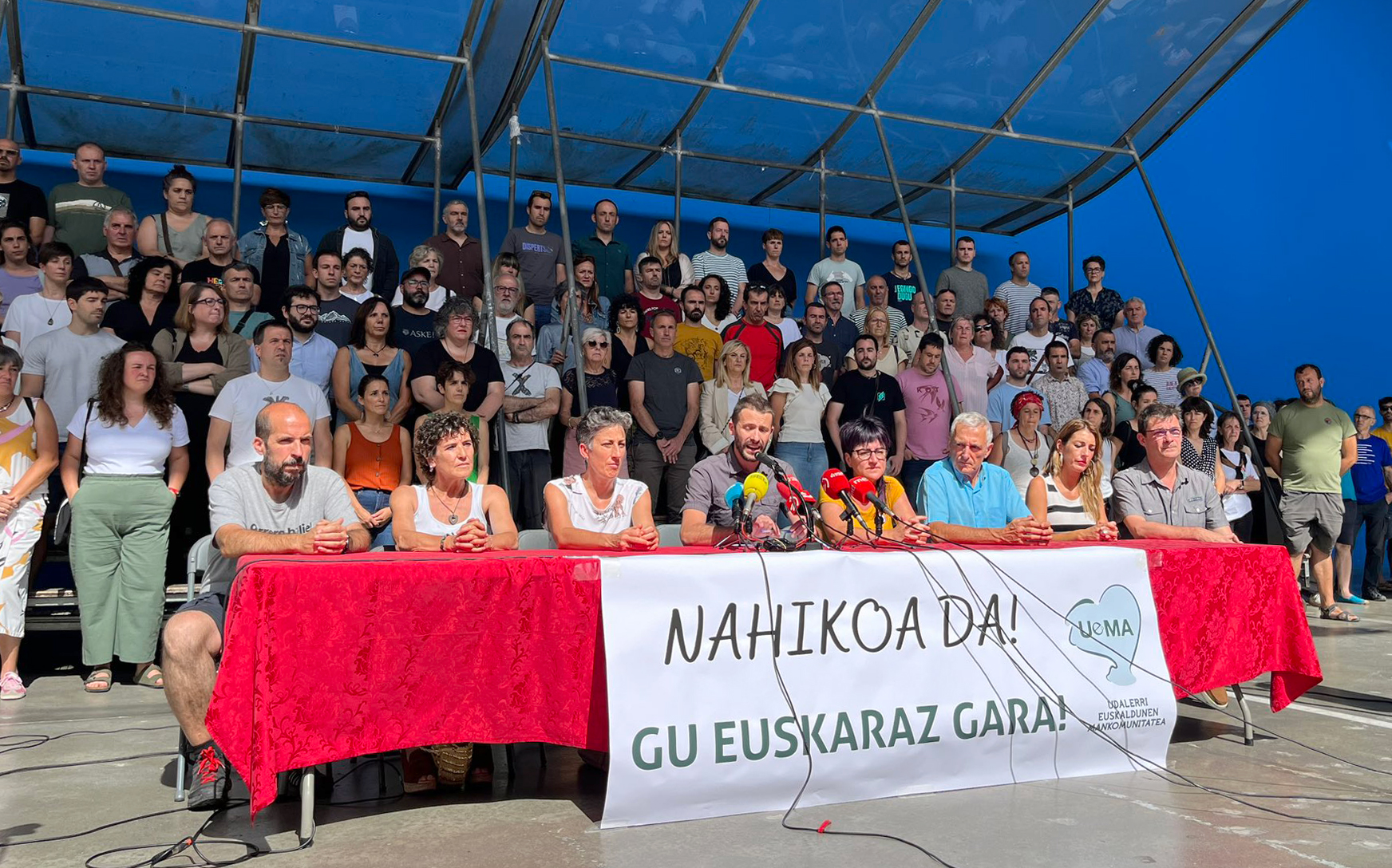"I think it is very dangerous that municipalities can act in Spanish"
- Well, soon a Municipal Law will be passed that gives more powers to municipalities. We have asked the UPV/EHU jurist Iñigo Urrutia what he says about the Basque country. It says that the Basque municipalities will be more protected, but it also lists the missed opportunities.

What has this draft Municipal Law contributed?
It is a draft law of a mandatory nature, especially to deal with the general reform that the Government of the State has launched in the field of local administration. The Municipal Law Bill regulates various subjects, municipal competencies, financing... and has been given place to the Basque.
It was necessary to work in Euskera at the municipal level, since the municipalities that work in Euskera are without legal coverage. The Law of the Vascuence, in 1982, provided for two systems, one facing the municipalities of Euskaldunes and the other general. The only system left is bilingual. It is too rigid for certain contexts, for example, for municipalities that want to function in Euskera, as they have to do so in Basque and Spanish. It was necessary to have in force a law that granted legal coverage to normal activity in Basque.
He has also made another contribution. Here the case law has been very restrictive. In Catalonia and Galicia, for example, when the judiciary has issued judgments, municipalities have naturally received the possibility of working in Catalan or Galician. However, such case law has not been applied in the CAPV and Basque municipalities have encountered numerous obstacles, especially in the judgments. In order to give a new reading to this jurisprudence it is very important to cover the normalized functioning in Basque through a law.
However, does this law allow municipalities to act with the Basque language as the preferred language?
In general, it takes this up, not to mention that it can be a priority. It is different if the individual wants to use Spanish, he should be answered in Spanish.
However, the law has some problems. The first is that, to the extent that it foresees a normal functioning in Basque, it also makes the normal practice in Spanish possible. So far the municipalities had to function in both languages. From now on, the municipalities will be able to speak in Basque, but also only in Spanish.
What consequences can it have?
It may be that the City of Barakaldo decides to do everything in Spanish. So far there was no way to do it. I would propose the following parameter: that the solar be of bilingualism, and from there, and taking into account the socio-linguistic situation, that approaches monolingualism, in Basque, with total normality. It seems to me very risky that you can speak Spanish, because from the point of view of the Basque Country you can go backwards in some contexts.
It leaves the fan very open.
Perhaps most of the peoples of some Alavese counties decide to speak exclusively Spanish as a language of internal functioning. It makes it legitimate.
It may vary depending on the political party in power.
I think that can be the case. The explanations I find in this new system of language use are two. On the one hand, to follow very closely the direction that the Constitutional Court opened in 2010, incorporating the limitations that the jurisprudence of the Constitutional Court has established in the language system. On the other hand, it should be the result of a political pact, in the negotiations between the PNV and the PSOE. It seems that, in exchange for covering the municipalities of Euskaldunes, the possibility has been opened for some municipalities to operate in full in Spanish.
You have already said that the bill has another limit: it does not protect all the documents that the City Council can do in Basque.
The draft contains a closed list. From a legal point of view, I do not see it as a sufficient basis. The activity in Basque should be completely legal, in addition to the documents cited here, the rest of the documentation can also be dealt with in Basque by a city council, as the Basque is official.
Does this particular list have any logic?
It is a list of documents contained in an old Spanish Royal Decree of 1986, such as calls for plenary sessions, agendas, motions, individual votes, proposals for agreements, etc., which can be written in Basque. There is a contradiction. On the one hand, the Law of Administration and Administrative Procedure of the State of 1992 establishes that the State's peripheral administration must work in Basque if the applicant uses the Basque Country, so it must collect all the documents of the files in Basque. On the other hand, according to the Municipal Law, only the 6-7 documents can be produced by our municipalities exclusively in Euskera. What about the others? That is a paradox. In the State Administration all documents in Euskera and only some in the municipalities of Euskaldunes.
Will the Spanish Government delegate to the CAV, Carlos Urquijo, have the opportunity to submit complaints?
Yes. With regard to Euskera, the Government Delegate considers it optional to resort to actions that are not expressly covered by the law. We therefore need to increase legal certainty.
Can you give an example?
In Azpeitia the road crosses. The Secretary of the City Council shall issue a report on the compatibility of the project with urban regulations. The document " Reports of the Secretary " is not included in this list.
Reparation is very simple, you can put a clause like “and the rest of the documents”, or you can say without quoting a specific document that all official documents produced in Basque will have a legal effect, provided that the language that individuals use is respected.
In fact, what language officiality means is that what is done in that language has the formal capacity to generate legal effects, without prejudice to the language that individuals want to use. Documents of internal operation can be produced in Basque without problems, while communications and services must be carried out in compliance with individual linguistic rights.
The Municipal Housing Law Bill has influenced that there can be no discomfort to the citizen. What does this mean?
This is linked to the language to be used in communications and is based on a judgment of the Constitutional Court of 2010. According to this ruling, municipalities can normally use Catalan or Spanish, provided that the documents are sent to private individuals in the language they want. The individual has the right to choose the language, so he does not need to make an express linguistic choice.
You can also understand the opposite. If the City Council has sent me the fine in Spanish, I can say that I will not give it legal value because it has not invented my language.
Is it the organization that has to guess what language the individual wants? What would be the conclusion, once it has been sent in bilingual and the problem has been overcome?
That is what the Constitutional Court has in its head, which is sent to it in both languages, and that does not create any discomfort for the individual. However, the Constitutional Court did not dare to express this idea, since the establishment of the language system is the responsibility of the autonomous communities, and balanced bilingualism is only one of the options, together with the normalised use of the language itself. In any case, I insist, individuals have the right to choose the language of documents. According to the sentence, the individual does not have to adopt an active position that forces him to change the language. Imagine: now the city hall sends the fine in Euskera to every person. The jurisprudence states that the City Council, before sending anything, must make an effort to know the language used by that individual and send it in that language. The problem is that the sentence says that the individual does not need to express the language they want, the administration has to get it right. That is quite incomprehensible.
In the Basque municipalities. Can you prevent it from being bilingual by asking the citizens the language of choice?
I think it is not a great discomfort to receive in one language and ask in the other if you wish. It can be unawkward, portable.
You prefer to speak only in Basque, but it may happen that some individual complains or that Urquijo returns.
In the Municipal Law it could be established that the municipalities respected the linguistic choice of individuals… or something like that. This could be enough, without literally translating that jurisprudence.
One more risk for municipalities in Euskaldunes.
In these municipalities there is a presumption, that all people are Euskaldun, or a very high percentage. Why if you understand Euskera, you can't communicate in Euskera normally?
Can the councilor who does not know Euskera condition the activity of the municipality in Euskera?
The law says that municipalities can function in Euskera normally, but it sets a limit: if all the people of the municipal corporation is Euskaldun you can speak only in Euskera, but if one of the councillors is in Spanish you cannot speak only in Euskera.
It seems to me that the law is not right, because municipalities can put mechanisms in these cases: to offer abstracts in Spanish, not to speak Basque but to understand... According to the law, the councillor of Lizartza can say that from then on it should be done in Spanish. It doesn't have any logic, it doesn't serve anyone. I do not think there is any real problem, and if there is any problem, the political parties should solve it and put the Basques.
Can a local councillor be required by law to know Basque?
Spanish legislation does not provide for this. In Latvia, however, in order to be a Member of Parliament, we need to know in Latvian. The case came to the Court of Human Rights, which ruled in 2002 that this is legitimate. A State may lay down linguistic requirements for the performance of political functions, where normalised parliamentary activity takes place in that language. The former director of the Basque Country of the Provincial Council of Gipuzkoa [Zigor Etxeburua] mentioned the issue and there was a scandal. It has no problem from the point of view of human rights.
Do you think that the Municipal Law is a useful tool to normalize municipal activity in Euskera?
So far, the Basque municipalities have acted without legal coverage and, in that sense, if it has an absolutely positive reading. The Basque municipalities will be more reassured. With regard to the possibilities of correcting weaknesses, I believe that there are still options in Parliament. The law has not included a specific treatment for the municipalities of Euskaldunes, so a reflection should be made. On the other hand, it makes the operation in Euskera completely legal, but, in return, it gives way to a practice entirely in Spanish, the penalty.
And finally, jurisprudence has kept them intact, with their limits. Jurisprudence can change, but if you pick up what the jurisprudence says in the law, you make it rigid. Too rigid, in my view, for linguistic standardisation issues.
Udal askotan, azken lau urteotan batik bat, pauso inportanteak eman ditugu hizkuntzaren normalizazioan: euskaraz ari gara lanean, ahoz eta idatziz. Asko kosta zaigu ele bitan lan egin beharraren (egia osorik esateko, gaztelaniaz sortu eta euskarara itzultzearen) mentalitatea urratzea eta euskaraz lan egiteari zilegitasuna eta balioa ematea. Bide hori legearen babesik gabe egin dugu, agintari eta langile batzuen ausardiaz eta borondatez. Eta izan dira erasoak eta ekaitzak, eta nola edo hala egin diegu aurre, legeak ez baitzuen behar adinako babesik ematen.
Euskarari atal bat eskaini diote EAEko udalen autonomia eta eskumenak indartu nahi dituen lege proposamenean. Zer berri dakar proposamenak guretzat, udaletan euskararen erabilera normalizatzen ari garen teknikariontzat? Hori da Hernanitik erantzuteko eskatu didatena. Eta Hernanitik, Adarra mendira begiratuta, gandu handi samarra ikusten dugula esan behar. Erdi bideraino seguru samar joateko babesgarriak jarri dizkigute. Estatuko ordezkariak ez gaitu amildegira botako beste administrazio batera dokumentuak euskara hutsean bidaltzen ditugunean, edota udaleko idatzi batzuk euskara hutsean idatziko ditugulako. Horiek babes juridiko osoa izango omen dute proposamen berrian. Baina, Besabitik gora Adarrako tontor aldera abiatu nahi duenak (alegia, Madrildik etorri diren erasoei aurre egiteaz gain udalak beren eguneroko bizitzan benetan euskaraz funtzionatzea nahi duenak) lehen bezalaxe joan beharko du, amildegiaren ertzetik eta babesgarririk gabe, ausardiaz eta borondate handiz.
Malores Etxeberria, Hernaniko Udaleko euskara teknikaria
Maren Belastegi, UEMAko lehendakaria
Zer ekarpen egin du egitasmoak?
UEMAren ustez Udal Legearekin pauso bat aurrera emango dugu. Udalei euskara lantzeko eskumena bera aitortzea urrats garrantzitsua izango da. UEMA mankomunitate gisa existitzeari berari ere legezkotasuna aitortuko dio Udal Legeak. Eta zalantzarik gabe, urrats garrantzitsua da hori. Horrez gain, 10/82 Euskararen Legeak eragiten duen ele biko funtzionamendu zurruna ere eteteko saiakera ikusten zaio, eta udalen lan eremuan, bereziki, euskara hutsez lan egiteari bidea zabaltzen dio lege berriak.
Zein ahulgune ditu?
Gure ustez hutsune garrantzitsuak ditu. Lehenengoa da udalei euskara sustatzeko eskumena eman bai, baina obligaziorik ez diela jartzen. Hala, une bakoitzeko agintarien esku geratzen da euskara sustatu edo ez sustatu. Horrez gain, legean euskaraz aritzeari mugak jartzen zaizkio. Kasuren batean, indarrean dagoen Euskararen Legearen inguruan egindako interpretazio murriztaileenak ezarritako mugak ere ez ditu gainditzen. Eta gure ustez hor euskaraz aritzeko aukera zabalagoa utzi beharko litzateke. Hizkuntza paisaia ele bietan egiteko derrigortasuna ezartzen du, kasu guztietarako, eta abar. Gainera, arautu beharko liratekeen beste hainbat kontu arautu gabe uzten ditu: kontratazioen kontua, egoera soziolinguistikoan eragina duten erabakien aurrean, eragina neurtu eta neurriak hartzeko premiak, eta abar.
Finean, euskararen kontua gehiegi landu gabe dago Udal Legean. Garrantzitsua da EAEk bere Udal Legea izatea, bestela estatukoaren menpe egon behar dugulako, baina hizkuntzaren kontuarekin oso azaletik aritu direla uste dugu. Hori eta gero, Udal Lege horrez gain, euskararen erabilera arautzen duten lege eta jarraibideekin egungo egoera hobetzeko adostasuna bilatzen hasi beharko dugu nahitaez. Euskararen normalizazioan, legeak ere alde beharko ditugulako.
Gai hauetan ohituta ez gaudenontzat, zail suertatzen zaigu ulertzea norainoko garrantzia duen lege honek. Baina labur esanda, pisu –eskuduntza– gehiago emango zaie udalei eta euren ordezkariei –egun Eudel– bere esparrukoak diren gaiak antolatzeko eta kudeatzeko orduan. Eta udal aginpide edo eskumen horien barruan, euskararen normalizazioari dagokiona.
Ez dut uste, alabaina, zeregin horietan jarduten dugunok aldaketarik nabarituko dugunik, baina egia da kanpoko erasoetatik –azken boladan bortitzak– babesteko lege berri hau bezalako teilatu sendo bat behar genuela aspalditik, orain arteko euritako ahul, higatu eta itoginez betea ordezteko. 35 urte luze behar izan dugu genuena beste modu apainduago batez aurkezteko: EAEn euskara hizkuntza ofiziala dugula, berezkoa, eta euskararen erabilera normala eta orokorra izango dela toki-erakundeen zereginetan eta, gainera, euskara toki-erakundeen jardueretan zerbitzu- eta lan-hizkuntza izango dela. Et voilà...
Udalei eskuduntzen pisu nagusia uzteak babesa bermatuko lioke euskarari, egunen batean Eusko Legebiltzarra euskararen kontrako indar politikoz beteko balitz. Aitzitik, zereginen atomizazioak perspektiba estrategikoa ukatzen dio garapen nazional orokorrari. Ni zentralizatzearen eta ez sakabanatzearen aldekoa naiz, batez ere hizkuntza normalizazioa bezalako gaietan, goitik beherako planteamenduarekin, bai, munduan diren beste komunitate eleaniztunetan arrakasta handiz egin bezalaxe.
Denborak argituko digu orain ikusi ezin dezakegun etorkizuna. Bitartean, nola ez, bide on asmo onez egindako lege berriari.
Felix Mugurutza Montalbán, Laudioko Udaleko euskara teknikaria
"Zubiak zeharka” lemapean, egun osoko egitaraua prestatu dute UEMA eguna ospatzeko. Herriko eragile guztiek hartu dute parte programaren prestaketan eta ekimen herrikoi eta partehartzailea izatea lortu dute horrela.

























